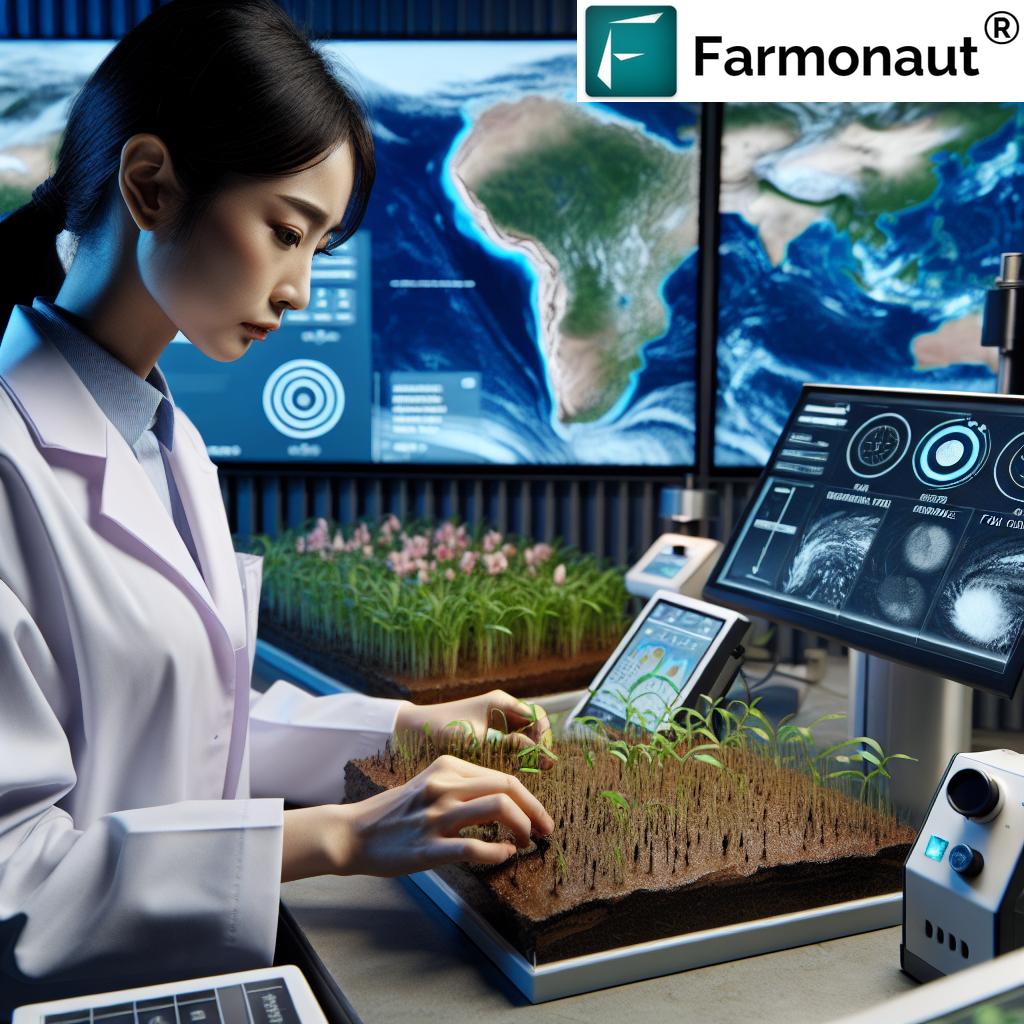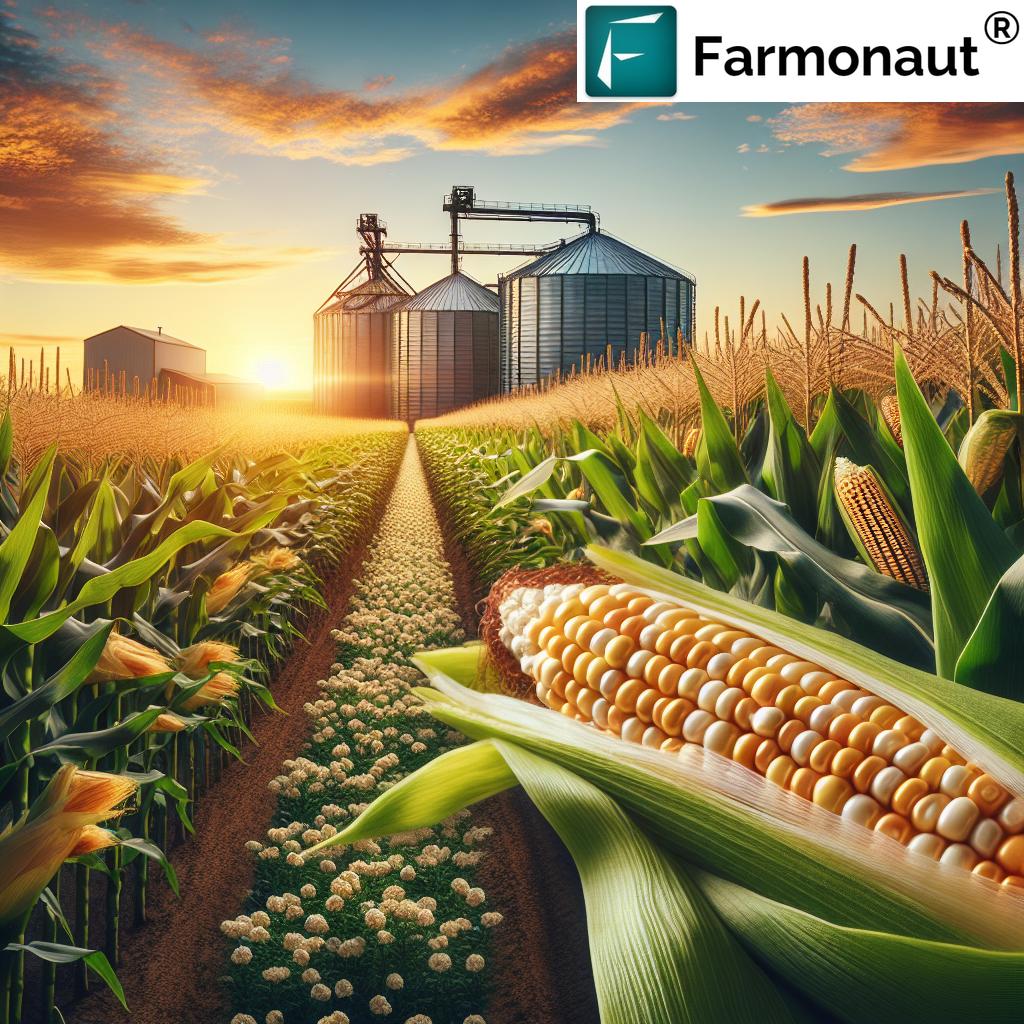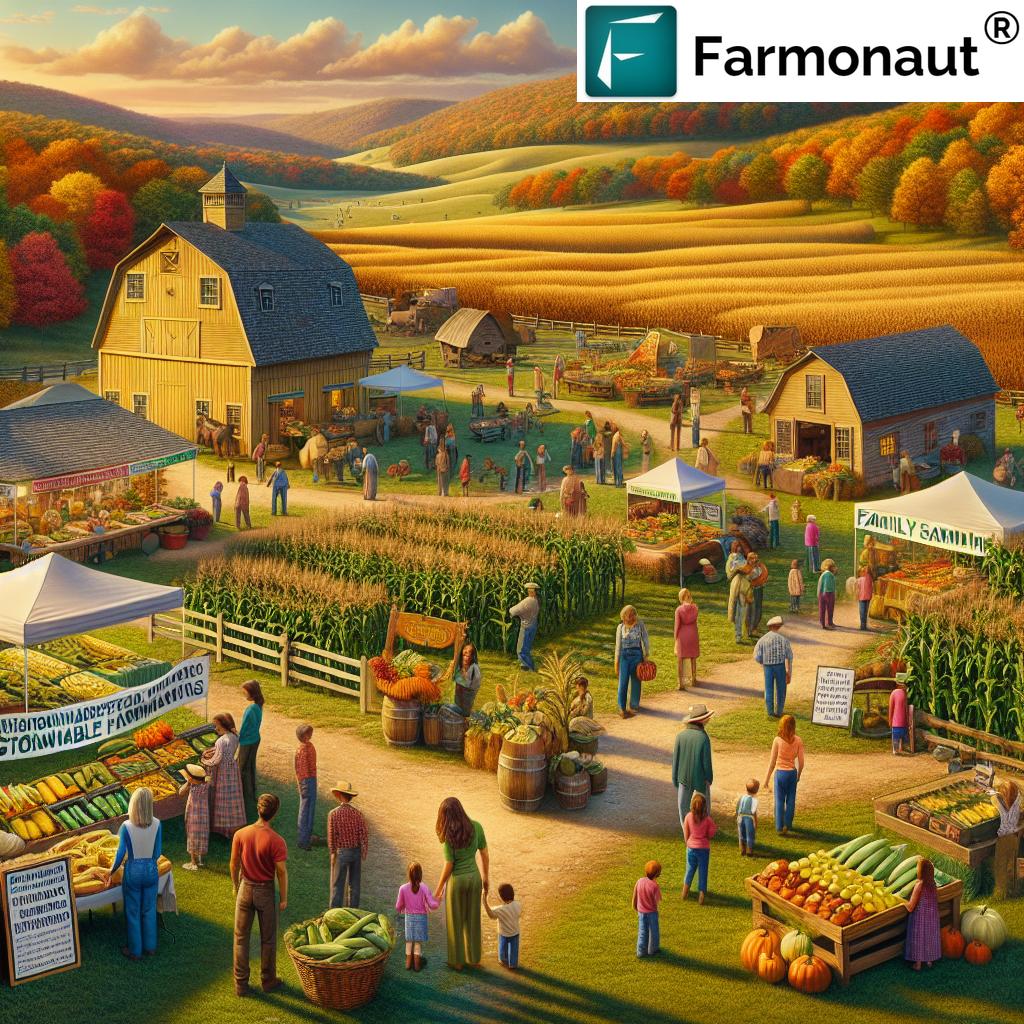Agriculture Knowledge Management & Farming: Allentown, PA — Unlocking Productivity & Resilience in 2025
Meta Description: Agriculture knowledge management empowers sustainable farming and agricultural land management in Allentown, PA. Discover how digital tools, precise data, and expert strategies boost yields and environmental stewardship in 2025.
- Introduction
- Core Concepts: Agriculture Knowledge Management
- Why Allentown, PA? Agricultural Land Management Landscape
- Digital Transformation: Platforms & Technologies
- Precision Agriculture in Allentown: Satellite, Sensors & Smart Data
- Collaborative Knowledge Networks & Stakeholder Empowerment
- Sustainable Agricultural Land Management in Allentown, PA
- Education, Capacity Building & Digital Literacy
- Building Resilience for the Future: Climate, Market & Uncertainty
- Farmonaut’s Role in Knowledge Management & Sustainable Farming
- Comparison Table: Digital Agriculture Tools & Techniques in Allentown, PA
- FAQ: Agriculture Knowledge Management & Sustainable Farming in Allentown
- Conclusion: The Future of Agriculture Knowledge Management in Allentown, PA
“Over 60% of Allentown farms now use digital platforms for crop and soil data management.”
Introduction
Welcome to the age of agriculture knowledge management—the systematic process transforming how farming, land stewardship, and agronomic decision-making unfold in Allentown, PA. As we venture into 2025, this foundational practice has become the cornerstone of effective, sustainable agriculture. It addresses the challenges and pressures imposed by evolving climatic conditions and fluctuating market dynamics. Regions like Allentown especially benefit as they balance maximizing yields with maintaining soil integrity, managing resource use prudently, and reducing their climate impact.
In this comprehensive guide, let’s unpack the cornerstone concepts, best practices, and next-gen technologies shaping agricultural land management in Allentown—while also showcasing how modern platforms, including those offered by Farmonaut, facilitate smarter, more resilient farming strategies for the years ahead.
Core Concepts: Agriculture Knowledge Management
Agriculture knowledge management is the systematic process of capturing, organizing, sharing, and utilizing information and expertise related to all stages of farming—from soil health assessment, crop choice, pest management, to resource optimization. In 2025, this knowledge encompasses:
- Insights on optimal agronomic practices, soil management, and crop rotation for sustainable yields.
- Application of digital technologies—remote sensing, machine learning, AI, and mobile applications—for data-driven decisions.
- Ongoing collaboration across local networks, academic institutions, state extension services, and farmer cooperatives.
- Adoption of sustainable agriculture and environmental stewardship strategies for resilient land management.
- Systematic knowledge sharing and real-time access to expert systems and advisories.
Effective management of agricultural knowledge minimizes information silos, accelerates adoption of innovations, and enables farmers to make smarter, faster decisions in challenging contexts.
Why is Agriculture Knowledge Management Imperative for Allentown, PA?
Allentown faces pressures typical of urban and peri-urban landscapes: a mix of intensive farms, smallholders, and diversified plots. Urban encroachment, limited water resources, and increasing regulatory requirements make agronomic agility an imperative. Unpredictable weather patterns and fierce economic pressures further necessitate a shift from isolated knowledge to integrated, real-time systems.
Why Allentown, PA? Agricultural Land Management Landscape
Allentown, Pennsylvania, exemplifies the complex landscape of 21st-century agriculture: rich soils, diverse crops, and a patchwork of farms ranging from small urban gardens to large peri-urban operations. Here’s what makes agricultural land management in Allentown, PA both unique and challenging:
- Soil Diversity & Integrity: Varying geologies and land use histories make soil health management central for sustainable productivity.
- Resource Constraints: Water scarcity, urban land pressures, and limited arable land demand judicious resource optimization.
- Climatic Pressures: Evolving weather volatility (late frosts, droughts, flash floods) demands agile, data-based responses.
- Urban Encroachment: Balancing growth with agricultural land preservation requires careful, informed planning.
- Regulatory & Economic Shifts: New state and federal environmental stewardship policies, carbon emission caps, and sustainability incentive programs influence management priorities.
Key Challenges Facing Allentown Farmers in 2025
- Maintaining soil health amid intensive production and urbanization.
- Managing water resources prudently in drought-prone seasonal cycles.
- Reducing the carbon footprint and aligning with evolving environmental policies.
- Adopting advanced techniques to boost yields without compromising land integrity or biodiversity.
- Bridging the “knowledge gap” among different generations of farmers and diverse plot sizes.
How Agriculture Knowledge Management Meets These Challenges
- Provides actionable information and best practices for all farming types and scales.
- Enables data-driven, location-specific decisions (e.g., optimal planting schedules, crop selection by microclimate, adaptive irrigation).
- Empowers farmer communities to troubleshoot issues and implement collaborative solutions rapidly.
- Facilitates compliance and reporting for sustainability programs, supporting environmental stewardship at scale.
Digital Transformation in Agriculture Knowledge Management: Platforms & Technologies
Digital transformation is central to modern agricultural land management in Allentown, PA. The integration of digital platforms facilitates everything from real-time field monitoring to advanced data analytics for smarter, more sustainable farming decisions.
- Satellite imagery and drone data deliver a “bird’s-eye” view for efficient crop health monitoring, detection of pest outbreaks, and resource mapping.
- Sensor networks (in-soil, weather, and hydrological) supply continuous, localized streams of information for optimal management.
- Farm management platforms and apps centralize data, advisories, and compliance tools to boost farm productivity.
- Cloud-based platforms ensure farmers can access timely insights and share experiences through collaborative networks, regardless of farm size.
- AI-based advisory services personalize recommendations, enhance decision-making, and automate routine monitoring processes.
In Allentown, an increasing proportion of farms—small and large—are plugging into this digital ecosystem. They rely on platforms for knowledge sharing, real-time advisories, and timely interventions that improve crop health and overall yield outcomes.
Notable Digital Tools in Allentown’s Agriculture Knowledge Management Landscape
- Farmonaut Satellite Platform: Offers real-time monitoring, AI-based advisories, and environmental impact tracking (Read more about Farmonaut’s large-scale farm management solution here).
- Mobile Management Apps: Deliver field-level scheduling, irrigation alerts, pest tracking, and compliance records directly to farmers’ mobile devices.
- Sensor Networks: Embedded devices measure soil moisture, temperature, and nutrient levels for decision support and resource optimization.
- Blockchain Traceability Systems: Secure, tamper-proof logging of crop origins, farm practices, and movement through supply chains (Explore Farmonaut’s blockchain-based traceability here).
- Weather Forecasting Services: Precision local forecasts integrating satellite and ground-station data for better climate adaptation strategies.
The advantage of these tools isn’t just granular data collection—but the ability to rapidly disseminate processed insights, empowering every farm to adapt, optimize, and thrive.
Precision Agriculture in Allentown: Satellite, Sensors & Smart Data
Precision agriculture is the convergence point where digital data collection meets systematic management of resources to optimize yield, soil health, and environmental stewardship. In Allentown, this is powering the next wave of sustainable farming knowledge.
- Satellites: Multispectral imagery tracks vegetation health, early pest infestations, field moisture, and crop development in real-time.
- Soil sensors: In-ground probes monitor salinity, pH, moisture content, and organic matter for granular decision support.
- Weather stations: Deployed on farms, providing hyper-local data for frost protection, planting schedules, and irrigation planning.
- Mobile apps: Interface with sensors and satellites to centralize agriculture knowledge management.
- Data analytics & AI: Platforms like Farmonaut process vast amounts of remote sensing data, transforming it into actionable recommendations tailored to the unique conditions of Allentown farms.
As a result, farmers can more accurately time interventions—such as fertigation, pest control, or harvest—maximizing productivity while minimizing waste and resource use. Satellite-based monitoring is also instrumental for crop loan & insurance verification (learn more about Farmonaut’s satellite-backed insurance solutions).
Precision Techniques: Examples Popular in Allentown, PA
- Variable rate fertilization: Application rates adjusted zone-by-zone based on real-time soil fertility data.
- Remote pest & disease detection: Early warning via NDVI and other indices helps optimize control method choice and timing.
- Irrigation optimization: Automated systems guided by soil moisture sensors and forecast models preserve water and support yield.
- Rotation and cover cropping: Rotating crops like corn and soy or using cover plants builds soil health and disrupts pest cycles.
- Satellite-based biomass and carbon tracking: Enabling smarter carbon footprinting (see Farmonaut’s carbon footprinting service).
All of these feed into a closed loop of knowledge sharing, data capture, and enhanced management, tailored for the dynamic agricultural land management landscape in Allentown, PA.
“Advanced agronomic techniques have increased Allentown farm yields by up to 18% since 2020.”
Collaborative Knowledge Networks Empowering Sustainable Land Management
No farmer operates in isolation—especially in Allentown’s intricate agricultural landscape. Collaborative knowledge networks are critical to farming knowledge and technology adoption in the region:
- Local extension services deliver research-backed advisories, connecting farmers with new agronomic techniques.
- Academic institutions—like Penn State University—contribute cutting-edge research and technology trials relevant to local soil, crop, and climate conditions.
- Farmer cooperatives and peer groups provide spaces for troubleshooting issues, sharing best practices, and distributing critical updates to enhance collective resilience.
- Digital communities—mobile forums, webinars, and online workshops—facilitate real-time knowledge sharing accessible from any field in Allentown.
These collaborative networks are the engine for troubleshooting, best-practice dissemination, and crowdsourced insight. They function as a bridge between traditional wisdom and cutting-edge science, essential for rapid innovation cycles in agricultural land management.
- Farmonaut API: For technology developers and agribusinesses in Allentown, the comprehensive API allows seamless integration of satellite imagery, climate data, and real-time crop analytics into custom dashboards or services.
- Farmonaut Satellite & Weather API Developer Docs: For local tech startups and agri-innovators building tailored agricultural services for Pennsylvania’s landscape.
Sustainable Agricultural Land Management in Allentown, PA
A key focus of agriculture knowledge management is maintaining land in a productive, resilient, and environmentally responsible state for generations to come. In Allentown, this means:
- Robust crop selection: Using data analytics to match crops to local soils, weather, and water resources (ex: drought-resistant maize, climate-resilient beans).
- Integrating crop rotations & organic amendments: Strategies disseminated via local extension networks and platforms boost long-term fertility and reduce input needs.
- Leveraging GIS & land suitability models: Advanced mapping for optimal allocation of land, supporting biodiversity, protecting sensitive areas, and avoiding resource overuse.
- Supporting biodiversity: Digital monitoring tracks the health of pollinator corridors, hedgerows, and buffer strips.
- Regenerative agriculture practices: Emphasizing cover cropping, minimal tillage, carbon sequestration, and cycling of nutrients (For more: Farmonaut’s carbon footprinting solutions).
- Compliance and Documentation: Automated digital records support audits for subsidies, insurance, or carbon credits.
By integrating knowledge management, digital tools, and collaborative practices, Allentown’s farmers are able to make evidence-based decisions for land use, boosting both short-term yields and long-term stewardship.
Education, Capacity Building & Digital Literacy for Sustainable Farming
Effective agriculture knowledge management depends on continuous education, training, and increased digital literacy. Allentown’s diverse farming community (from small-holders to corporate operations) relies on state extension offices, demonstration farms, and digital workshops to:
- Promote ongoing learning: Webinars, in-field demonstration days, and workshops share latest agronomic practices and regulatory updates.
- Increase digital literacy: Efforts target small-scale and older farmers to ensure technology adoption is inclusive and equitable across urban and peri-urban landscapes.
- Support certification: Training in pesticide handling, safe input use, and sustainable land management helps meet policy and market requirements.
- Build resilience: Sharing resources, “how-to” guides, and case studies equips farmers to manage climatic shocks, market volatility, and pest outbreaks.
- Capacitate youth: This builds the next generation of tech-savvy farm managers who will lead Allentown’s transition to sustainable, precision agriculture (Check Farmonaut’s crop plantation and forest advisory for dynamic digital training resources).
The combination of education, access to technology, and peer-driven knowledge sharing is vital for sustaining innovation cycles in Allentown’s agricultural landscape.
Building Resilience: Future-Proofing Allentown Agriculture with Knowledge Management
As climate change accelerates and market conditions remain unpredictable, resilience is no longer optional. Knowledge management enables Allentown farmers to respond, adapt, and thrive:
- Historical data archive: Digital platforms retain weather, pest, and yield records, fueling predictive analytics for smarter planning.
- Early warning systems: Fast dissemination of alerts enables rapid interventions in the face of droughts, flooding, or pest outbreaks.
- Crop diversification guidance: Decision support helps diversify cropping portfolios, cushioning against price and climate shocks.
- Insurance & financial planning: Satellite-backed evidence is used for insurance claims, disaster relief, or securing credit (see Farmonaut’s solutions).
- Resource allocation: Aggregating and analyzing inputs leads to smarter, more agile, and cost-effective resource distribution.
Agricultural knowledge management functions as a risk management system, insuring Allentown’s farming future against the unknowns of 2025 and beyond.
Farmonaut’s Role: Enabling Smart Agriculture Knowledge Management & Land Stewardship
At Farmonaut, our mission is simple: make satellite-driven insights and advanced data solutions affordable and accessible for every stakeholder in agriculture—farmers, agribusinesses, and governments. Here’s how we support the systematic process of capturing, organizing, sharing, and utilizing knowledge for advanced farming and agricultural land management in Allentown, PA:
-
Satellite-Based Monitoring:
We leverage multispectral satellite imagery to provide continuous monitoring of crop and vegetation health (NDVI), soil conditions, and infrastructure. This empowers users with evidence-based decision-making to boost productivity and resource management—without expensive hardware. -
JEEVN AI Advisory System:
Our AI-powered tool transforms data into tailored, real-time recommendations on weather, irrigation, pest management, and planting schedules, enabling users to maximize yield and operational efficiency. -
Blockchain-Based Traceability:
With blockchain solutions, we secure the journey of agricultural products, ensuring transparent, tamper-proof records of farm inputs and processes—meeting market and consumer demand for traceability. -
Fleet & Resource Management:
Our platform provides resource optimization for logistics and equipment management, reducing operational costs for both smallholdings and large peri-urban operations. Read more about fleet management here. -
Environmental Impact Monitoring:
We offer real-time carbon footprinting modules for agriculture—tracking emissions, supporting compliance, and enhancing land stewardship. -
APIs and Developer Tools:
We make satellite insights easy to build into any agricultural system or service in Allentown. For more information, see our API documentation and API portal. -
Scalable for All:
Whether it’s a small urban plot or a vast enterprise, our modular platform can be scaled for every operation.
The value proposition is clear: cost-effective solutions for knowledge management that are rooted in precision, transparency, and sustainability—specifically designed for the evolving needs of Allentown agriculture in 2025.
Get Started with Farmonaut: Flexible Subscription Options for Allentown, PA
Comparison Table: Digital Agriculture Tools & Techniques in Allentown, PA
| Tool/Technique Name | Functionality | Estimated Increase in Productivity (%) | Sustainability Impact | Ease of Adoption | Relevance to Allentown, PA |
|---|---|---|---|---|---|
| Farmonaut Satellite Monitoring | Remote sensing, data analytics, AI advisories, carbon & crop monitoring | 15–20% | High | Easy | Very High |
| Mobile Farm Management Apps | Field scheduling, alerts, records, compliance, knowledge sharing | 8–12% | Medium | Easy | High |
| Precision Agriculture Sensors | Soil moisture, nutrient, and climate monitoring | 10–15% | High | Moderate | Very High |
| Blockchain Traceability Tools | Supply chain transparency, fraud prevention, compliance | 3–7% | High | Advanced | High |
| GIS Land Suitability Modeling | Land allocation planning, crop suitability analysis | 10–14% | Medium | Advanced | Very High |
| Fleet & Resource Management Tools | Vehicle, equipment logistics & optimization | 2–5% | Medium | Moderate | High |
| Online Training & Advisory Services | Education, capacity building, digital literacy | Intangible | High | Easy | High |
FAQ: Agriculture Knowledge Management & Sustainable Farming in Allentown, PA
What is agriculture knowledge management and why is it essential?
It is the systematic process of capturing, organizing, sharing, and utilizing information and expert insights about farming practices, soil health, crop decisions, pest management, and resource optimization. In Allentown, PA, this ensures smarter responses to climatic and economic pressures, leading to sustainable increases in productivity and enhanced stewardship of agricultural land.
How do digital tools improve agricultural land management in Allentown, PA?
Digital platforms—ranging from satellite imagery to mobile farm management apps—enable precise, context-specific decisions. Farmers can monitor soil, crop health, pests, and weather in real time, optimize inputs, and better comply with environmental regulations, which is particularly important for Allentown’s mix of urban and peri-urban farms.
What are the key sustainable practices promoted through knowledge management in 2025?
Key strategies include crop rotation, use of organic soil amendments, cover cropping, minimal tillage, regenerative agriculture, carbon footprint tracking, smart water management, and digital record-keeping for compliance and transparency.
How does Farmonaut’s technology support agriculture in Allentown?
Our technologies empower farmers with real-time satellite monitoring, AI-enabled advisories, blockchain for traceability, resource and fleet management, and carbon footprint tracking. This supports more effective, transparent, and sustainable agricultural land management tailored for Allentown’s unique landscapes and climate.
Which Farmonaut products are best suited for farmers and agribusinesses in Allentown?
- Satellite Monitoring & AI Advisory: For field health analysis, yield prediction, and pest alerts (learn more).
- Blockchain Traceability: For certified supply chain transparency (read here).
- Fleet Management: For large-scale resource logistics (details).
- API Access: For developers and businesses looking to integrate farm data insights.
How do collaborative knowledge networks support resilience?
They enable rapid troubleshooting, best-practice dissemination, and collaborative problem-solving. Through digital and physical networks, Allentown’s stakeholders share evolving climate strategies and adapt to market fluctuations as a community, ensuring everyone benefits from the latest research, technology, and peer experience.
Conclusion: The Future of Agriculture Knowledge Management in Allentown, PA
As we move forward into 2025 and beyond, agriculture knowledge management is more than just a buzzword—it’s an essential enabler for resilient, productive, and sustainable farming in regions like Allentown, PA. The integration of digital tools, data-driven platforms, and collaborative networks bridges historical farming wisdom with future-ready science and technology. By investing in systematic knowledge sharing, advanced agronomic techniques, and transparent land stewardship, the Allentown agricultural community can rise above uncertainties and ensure food security for generations.
Let’s continue to elevate Allentown’s agricultural land management—driving innovation, building resilience, and cultivating a vibrant, sustainable future for farmers, their families, and the community at large.













